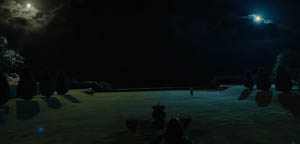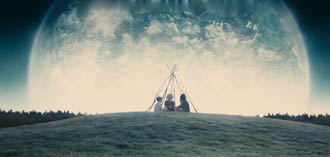|
Lars "I'm a Nazi" von Trier's grueling meditation on depression is, in effect, about two pairs of sisters. One pair is human: Justine, and her sister Claire, whose names grace the film's two distinct halves. The other pair are planets: Earth, with which we're pretty familiar, and Melancholia, a planet described as having previously been "hiding behind the sun," and which is one huge metaphor for exactly what its name suggests. This film is one of those that critics seem to fawn over, the sort where one could reasonably expect any criticism to be met with replies from movie snobs smugly insinuating that those who choose to spend their time watching ponderously slow, depressing films full of unlikeable characters are somehow the superiors of those who watch movies to have a good time. I expect that these same folks would balk at the suggestion that their filet mignon should be drizzled with stale urine and rabbit droppings on the implication that people who enjoy pleasant, satisfying meals are rubes who aren't brave enough to slog through a meal seasoned with excrement in order to experience the grinding angst of life.
The film begins with a scene in extreme slow motion, as Justine watches the world end when Melancholia smashes it to bits. It's unclear if this is meant to be a vision or a flash-forward (it's still not clear on this point by the end of the film, either). We then move on to the main point of business: Justine's wedding reception. She's late for it, as is her new husband, but seems to have a decent enough excuse. Her sister is angry about the delay, her brother-in-law steams over the funds he's funneled into a party from which Justine will continue to disappear over the course of the night, and her mother is unhappily married and not shy about saying so at the most inappropriate moments. Her husband seems to be a brave man, seeing as how he's managed to look his bride's debilitating depression in the eye and still go through with the wedding. But before the night is done, we'll see that he's also not a masochist. Justine, it seems, can only evince a glimmer of interest in a tiny speck up in the sky, one which seems to be on the move. 
The second half of the film moves into the subject of the newfound planet and its impending fly-by of earth. Claire frets, despite her husband John's assurances that there is no threat of a collision. From the prologue, we suspect otherwise. Justine, seemingly unable to cope with life, has moved into the couple's expansive country home. The subject of potential apocalypse leaves her unaffected; living under the specter of gloom and doom is par for the course where she's concerned. As the threat seems to loom ever larger, the film stays small in focus. There are no views of the rest of the world as they cope with the same uncertain future, no instances of "exposition by newscast" to broaden the perspective. To do so would feel too much like a traditional disaster film, when the real disaster seen here is in the self-destructive nature of our dubious protagonist. This has been frequently described as a "science fiction" film, owing to the planetary collision plotline. It assuredly does contain much fictional science. Reality is ignored and strained in order to make the metaphorical aspect functional, even as it undermines objective believability. Just past the halfway point, John attempts to assuage his wife's fears by uttering one of those cringe-inducing lines that make it clear just what will come of things: "You have to trust the scientists." There can be no doubt what is meant by this, as screenplays notoriously do not trust scientists, and neither do the teeming masses of humanity who seem oblivious to the fact that their lives have been consistently made more comfortable by science. To the degree that von Trier actually aspired to an SF story, he has failed utterly, as the incoming planet behaves in a way that it simply could not, with the discrepancies explained away by saying that the scientists miscalculated. In context, this is tantamount to a character releasing a ball from his hand, seeing it fall up into the sky, and bitching that those hubristic, arrogant scientists miscalculated how gravity works. I can't help but feel that most people's bizarre distrust of science stems from constantly hearing about it from those who understand it the least. 
There are some striking images in this film, not the least of which being Kirsten Dunst reclining nude on a hillside under Melancholia's turquoise glow, though the thought of a nude Kirsten Dunst conjures up feelings of joy nowhere to be found in the film containing them. Perhaps the most effective image is of the approaching planet as viewed through a simple tool fashioned by Justine's nephew for measuring its relative distance; it has a relatable, visceral and frightening feel to it that could not be matched by any amount of 3-D graphical representations flashing across giant NORAD monitors, as I imagine Michael Bay would've done in the same situation. And ultimately, I do think the depiction of severe depression as one person's own Apocalypse is effective in communicating such feelings to the rest of us, though I'm dubious of whether I'm any better off for knowing it. However, the clichéd "scientists are complete morons" plot device leaves me cold, and it's frustrating that the film is ultimately content to wallow in depression, without any sense that it's trying to find a solution other than to suggest that the clinically depressed would be better off dead. I expect many of them would agree with that, but I doubt they'll benefit from the recommendation. -review by Matt Murray
|
|
||||||||